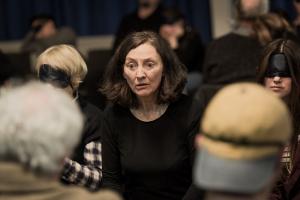All That Fall review of Max Stafford-Clark's new production of Beckett's radio play
Blindness and sight are two key recurring themes in Beckett's work and often act on both a metaphorical and physical level. In his 1956 play 'All That Fall', it's Maddy Rooney's husband Mr Rooney who is blind, and their journey home from the train station where an unfortunate accident has occurred leads to a revelation of sight for Mr. Rooney herself. Written as a radio play, the piece is only allowed to be performed as such, and Max Stafford-Clark's careful and visionary production maintains that intention whilst providing an invigorating auditory treat.
Explaining before the performance that it proved to be more cost effective to blackout the audience than the space, Stafford-Clark provides his audience with small blindfolds which are worn throughout the entire performance. What is created is the effect of listening to the radio drama whilst the ensemble of live actors experience the play around the space.
In the beautifully scenic environment of Wilton's Music Hall, it seems disappointing to hide your eyes from the stunning interior space. Acoustically, the venue boosts the vocal performances, with two levels of seating offering vastly different experiences. Unlike listening on the radio, the soundscape comes from all around you, and you're constantly aware of your proximity and distance to the voices.
Whilst simpler in style to other Beckett dramas, the piece feels more conventional on the outside, but maintains the Beckettian nihilism that underlines much of his work. His treatment of small town rural Ireland paints a vivid landscape from which the overhanging themes of time and death can operate within. The naturalism serves the drama, which builds to the final revelation that's deliberately left unresolved.
Moments such as hoisting Mrs Rooney into Mr Slocum's car prove to be a feat of direction and delivery, with Beckett's specific choices of words aiding the sound effects that make the production really come alive. Impressive sound design by Dyfan Jones curates the animal noises, live sound effects and voices into a controlled and fully realised soundscape.
It's beautifully spoken with a mix of vocal tones and timbres that draw out the lyricism in Beckett's language. There are points where you find yourself somewhat hypnotised by the accent and vocal patterns - an experience that's fundamentally heightened by losing your sense of sight. Without such visual distractions, your brain works overtime to paint the landscape and characters, with a satisfying and highly personal result.
Brid Brennan makes a commanding Mrs Rooney, finding both the comedy and stature required to drive the simple yet fascinating journey. Stafford-Clark speaks in his programme notes about making her character more 'impossible', and Brennan finds that edge whilst still maintaining enough endearing qualities to keep you with her until the end. Gary Lilburn is highly impressive as both Mr Tyler and Mr Rooney with a calming richness a strong sense of control that keeps you guessing as to his relationship to the accident.
There has been much fascination by directors through the ages who have attempted to stage the drama, against Beckett's best will and wishes. Calling the piece a 'radio text for voices, not bodies' he believed that to 'act' it is to kill it. In this production, Stafford-Clark has balanced this desire with an audience's need to collectively experience the text, and the production manages to remain faithful yet seem truly innovative.
Originally published on
